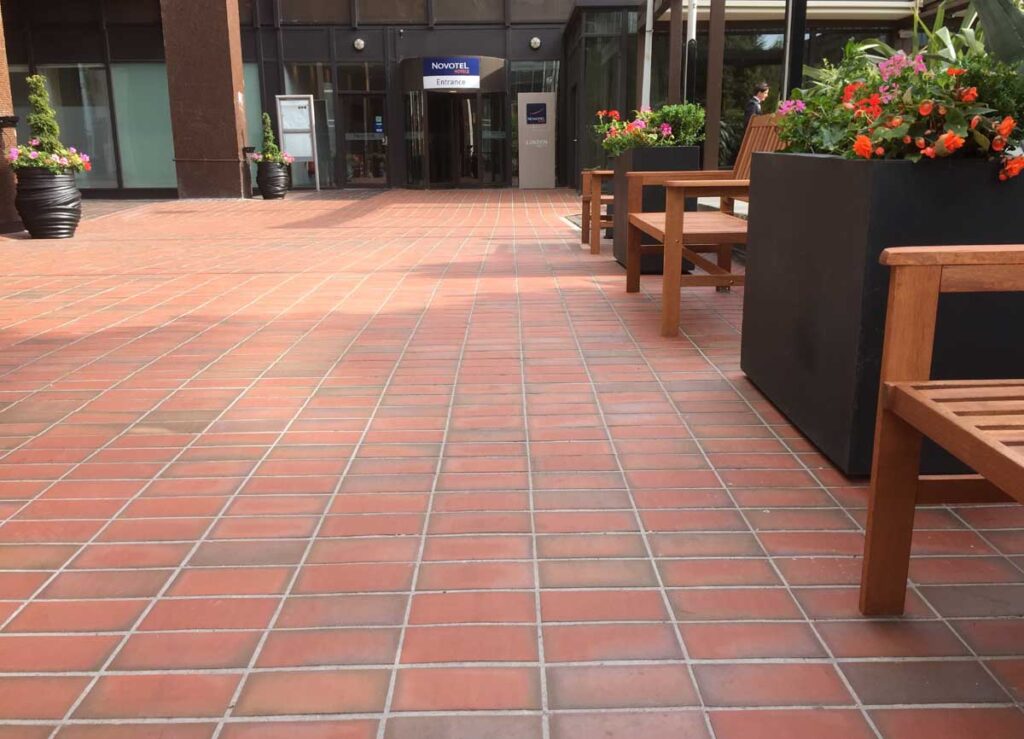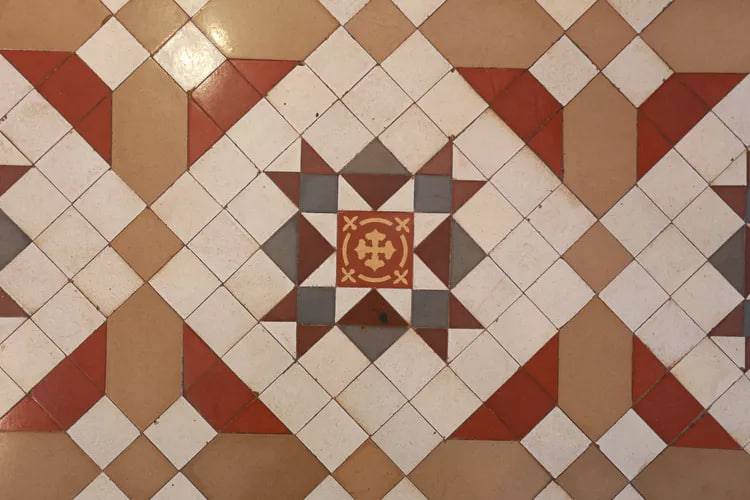Shopping for floor tiles can be overwhelming! There are so many choices, especially when it comes to hard, stone-like tiles. Quarry tiles, terracotta, ceramic, and porcelain all sound similar, but there are key differences.
This guide focuses on quarry tiles. What makes them unique? Unlike other options, quarry tiles are naturally dense and don’t have a glazed surface. Keep reading to discover the benefits of quarry tiles and where they shine in your home!
Quarry Tile: The Tough and Timeless Flooring Choice
Ever wondered about those beautiful, hard-wearing floor tiles? Quarry tiles might be the answer!
Made from natural materials like clay, shale, and feldspar (often found in quarries!), they are formed and fired at high temperatures, similar to bricks. But here’s the twist: despite the name, quarry tiles aren’t actually mined from quarries.
Here’s what sets them apart:
- Tough and Tight: Unlike clay bricks, quarry tiles are extra hard due to the firing process and mineral mix.
- Water-Resistant Warrior: Quarry tiles are denser and less porous than terracotta tiles, meaning they resist water better.
- Natural Beauty, No Glaze: Forget the shiny surface! Quarry tiles have a natural, unglazed finish, unlike ceramic and porcelain tiles.
This unique combination of strength and natural beauty makes them a popular choice for many flooring needs.
The All-Natural Quarry Tile Flooring Option
- Made for Strength: Unlike granite slabs cut from quarries, quarry tiles are formed by grinding natural minerals, shaping them, and firing them at intense temperatures (over 2,000°F!). This process creates incredibly strong and durable tiles.
- Versatility for Homes & Businesses: Quarry tiles are perfect for both indoor and outdoor use. They add a warm, natural touch to sunrooms, entryways, and kitchens in homes. Their durability and stain resistance make them popular in high-traffic areas of commercial buildings.
- Earthy Beauty: Quarry tiles typically come in red, brown, gray, or tan. Lighter shades are available, but remember: unsealed lighter tiles may show stains, especially outdoors.
- Water Resistance: While not completely waterproof, quarry tiles have a low absorption rate (0.5-3%) making them suitable for damp areas.
- Sealing is Optional: High-quality quarry tiles can go unsealed thanks to their dense composition. However, sealing can further enhance stain resistance, especially for lighter tiles.
- Size Matters: Unlike larger ceramic tiles (12″x12″ or more), quarry tiles are usually smaller, often found in 6″x6″ squares, although they can range up to 8″x8″. They are also thicker than most ceramic tiles, offering added strength (typically 1/2″ to 3/4″ thick compared to 3/8″ to 5/8″ for ceramic).
- Texture Options: Quarry tiles come in both textured and smooth finishes. Textured tiles offer excellent traction for outdoor use, while smooth tiles feel comfortable underfoot for interiors.
- Sealing Without Fear: Don’t worry about ruining your tiles! Sealing does not alter the color and can actually protect them from stains and discoloration.
Quarry Tile: Weighing the Pros and Cons
Pros:
- Safety First: Quarry tile’s textured surface provides excellent slip resistance, making it a great choice for areas prone to moisture, like bathrooms and entryways.
- Durable and Long-Lasting: These tiles are incredibly strong and resilient, making them ideal for high-traffic areas. Their low water absorption rate also enhances their longevity.
- Versatility Indoors & Out: Quarry tile can be used in various spaces, from kitchens and living rooms to patios and walkways. They add a natural aesthetic to any environment.
- Thickness Adds Strength: Compared to other tiles, quarry tiles are thicker, contributing to their durability and providing a more solid feel underfoot.
Drawbacks:
- Cutting Challenges: Their thickness and strength can make them difficult to cut for precise installations. Consider hiring a professional for intricate cuts.
- Comfort Considerations: The textured surface can feel hard on bare feet. Area rugs can help soften the feel in living spaces.
- Susceptible to Impact Damage: Heavy objects can chip or crack quarry tiles. Avoid using them in areas with a high risk of heavy object drops.
- Limited Design Options: While quarry tiles come in natural earth tones, the color and size selection might be more limited compared to other tile options.
- Potential for Efflorescence: Salts within the tile can migrate to the surface and create a hazy white film (efflorescence) if exposed to moisture. Proper sealing can help mitigate this.
Earthy Elegance: Quarry Tile’s Color Palette
While not as vast as some other tile options, quarry tiles boast a natural beauty that comes in a range of earthy tones. Here’s what to expect:
- Natural Variation: Quarry tiles are made from natural materials, so slight variations in color and shade are inherent. This adds to their unique charm and creates a more organic look.
- Classic Red: The most popular choice, red quarry tiles reflect the natural color of the clay used in their production. It’s a warm and timeless option.
- Earthy Spectrum: Beyond red, quarry tiles come in shades of dark and light gray, tan, brown, and beige. This spectrum allows you to choose a color that complements your desired aesthetic, from rustic to modern.
Choosing Your Perfect Shade:
Consider the overall feel you want for your space. Lighter tones can brighten an area, while darker shades create a bolder statement. Remember, lighter unsealed tiles might show stains more easily.
Seal or No Seal? Deciding on Quarry Tile Protection
The good news: Quarry tile is naturally dense and resists stains fairly well. Sealing isn’t always mandatory. However, here are some situations where sealing can be beneficial:
- High-Traffic Areas: In kitchens, entryways, or mudrooms where spills and tracked-in dirt are common, sealing can add an extra layer of protection against staining.
- Oil and Grease Exposure: Kitchens near stoves or workshops are prone to oil and grease splashes. Sealing helps repel these substances and makes cleaning easier.
- Lighter Colored Tiles: Unsealed, lighter colored quarry tiles might show stains more readily. Sealing helps prevent staining and keeps them looking their best.
Choosing the Right Sealant:
When sealing, opt for a water-based penetrating sealer, not a surface sealant. Penetrating sealers soak deeper into the tile, providing superior moisture and stain repellence.
Breathe New Life into Your Home with Dex Flooring’s Quarry Tiles
Tired of the same old floors? Dex Flooring has the perfect solution for you: classic and durable quarry tiles!
Discover the timeless beauty and unmatched functionality of quarry tiles. Our extensive selection boasts:
- Unmatched Durability: Perfect for high-traffic areas, both indoors and outdoors.
- Natural Slip Resistance: Keeps your family safe in moisture-prone areas.
- Earthy Elegance: Warm tones that complement any design style.
- Easy Maintenance: Low maintenance and simple cleaning.
Dex Flooring’s Experts Help You Every Step of the Way
From selecting the perfect tile to professional installation, our team is here to guide you. Visit Dex Flooring today or browse our online selection to find the perfect quarry tiles for your home!
Quarry Tile FAQs:
What are quarry tiles made of?
Quarry tiles are formed from natural minerals like clay, shale, and feldspar, ground together, shaped, and fired at high temperatures.
Are quarry tiles slippery?
No, quarry tiles, especially those with a textured surface, offer excellent slip resistance, making them ideal for bathrooms and entryways.
Are quarry tiles durable?
Absolutely! Quarry tiles are incredibly strong and resilient, perfect for high-traffic areas. Their low water absorption rate also enhances their longevity.
Can I use quarry tiles outdoors?
Yes, quarry tiles are a great choice for patios, walkways, and other outdoor areas thanks to their durability and slip resistance.
Do quarry tiles need to be sealed?
Sealing isn’t always necessary, but it can be beneficial in some situations. Sealing is recommended for high-traffic areas, areas prone to oil and grease splashes, and lighter colored tiles to prevent staining. Opt for a water-based penetrating sealer for the best results.
How do I clean quarry tiles?
Regular cleaning with a damp mop and a mild detergent is usually sufficient. Avoid harsh chemicals that can damage the tile’s surface.
Can I scratch quarry tiles?
Yes, while they are very strong, quarry tiles can be scratched by abrasive cleaners or heavy objects.
What colors do quarry tiles come in?
Quarry tiles boast a natural beauty with a limited but earthy color palette. You’ll find them in shades of red, brown, gray, tan, and beige.
What size are quarry tiles?
Unlike some other tiles, quarry tiles have a limited size range. They are typically found in 6″x6″ squares, although they can range up to 8″x8″.
Can quarry tiles be used on countertops?
While possible for secondary counters, use them with caution. Their surface can scratch more easily than other countertop materials.


